
You are in :
Water future - Confronting the Water crisis

Confronting the Water Crisis
The lack of renewable fresh water resources in Abu Dhabi represents a growing challenge to its future growth and sustainability. Growing population, rising standards of living, and a rapidly expanding and diversifying economy all exert immense pressure on a quickly shrinking, non-renewable resource. Only now is the Emirate coming to terms with this urgent situation and looming crisis. Solutions must be developed and implemented soon and they will require action across sectors and society from government, industry and specific sectors such as agriculture and forestry as well as the citizens themselves.
Changing behaviours and attitudes towards water usage will be vital, including the development of a conservation culture. However, experience has shown that shifting from a culture of overt consumption to one of prudent conservation takes time and the available time for action, like the water resources, is fast disappearing.
Better Coordination, Regulation and Enforcement
Better coordination between the entities managing water and power and greater clarity as to the roles and responsibilities of each will help streamline water management. Improved standards and practices regulating water use in the various sectors, as well as a strong, independent authority to regulate and enforce water policy are also needed. And, although the quality of water-related data has improved, its value is limited unless it is more widely shared.
Dry and Native Landscaping
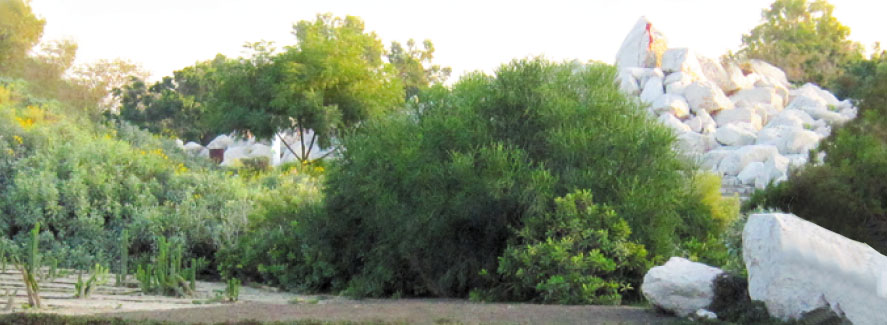
Amenity plantations in Abu Dhabi's urban areas sometimes tend to mimic the lush landscapes of other more tropical climates. Switching to low water demand landscapes and increasing use of native plants could significantly reduce urban consumption. Accordingly, Abu Dhabi Municipality has initiated successful programmes in recent years to modify their landscaping schemes to use more xerophytic (dry environment-tolerant) and halophytic (saline-tolerant) plants.
Reducing Agricultural Subsidies

Rhodes Grass, a forage crop, accounts for more than half of agricultural water and energy demand and 20% of all water consumed in the Emirate. Government subsidies encourage its production and support a growing livestock industry, which also consumes water. Therefore, reducing or eliminating the large subsidy for Rhodes Grass would lead to substantial energy savings (particularly when desalinated water is used to improve water quality). Restricting the use of desalinated water in agriculture could immediately reduce water demand and provide a larger share for other uses and lead to energy savings.
Forestry Alternatives
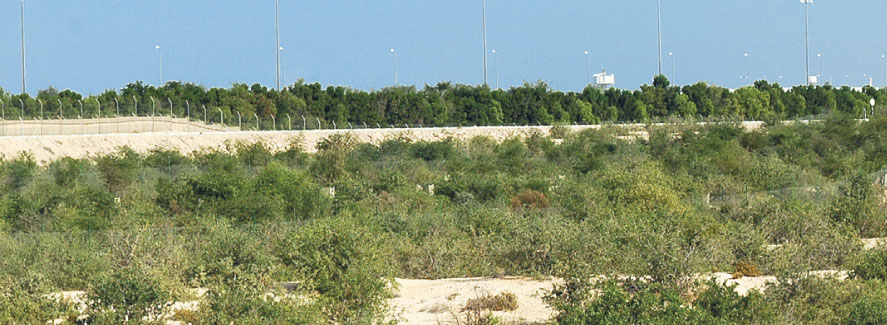
Policies that set limits on the amount of water allocated to forestry production, along with discontinuing expansion of forest plantations, will relieve some of the stress on groundwater reserves. Exploring alternative methods of satisfying the original intended purpose of the forests, which originated with Sheikh Zayed's plans for greening the desert and wildlife conservation, may reveal more sustainable solutions to meeting these important needs.
Raising Awareness
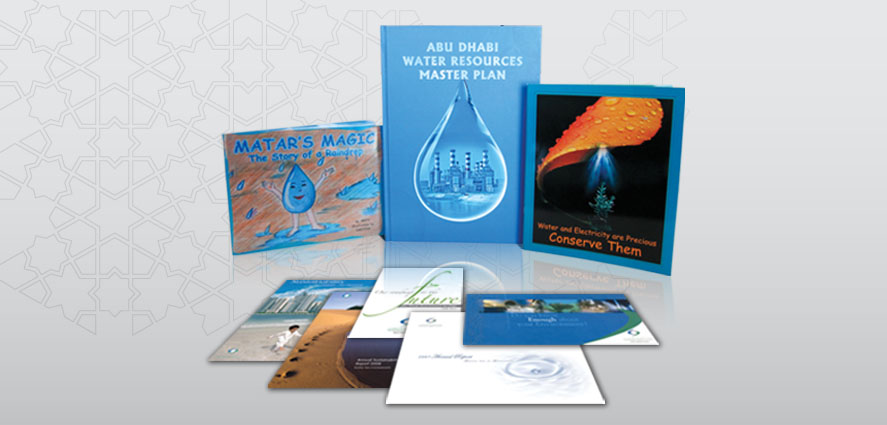
Awareness-raising is an important part of any water conservation strategy. EAD has launched campaigns to highlight the complex relationship between water production, energy use and the environmental and social benefits of conservation.
Finding Sustainable Solutions
Meeting Abu Dhabi's future water needs requires a multi-pronged approach that both capitalises on technology but also, perhaps more importantly, controls demand. There are many alternatives to meeting our future water needs – some more sustainable than others. Sorting through the myriad of alternatives can be difficult and requires careful consideration of each alternative's costs and long-term benefits.
Water Tariffs
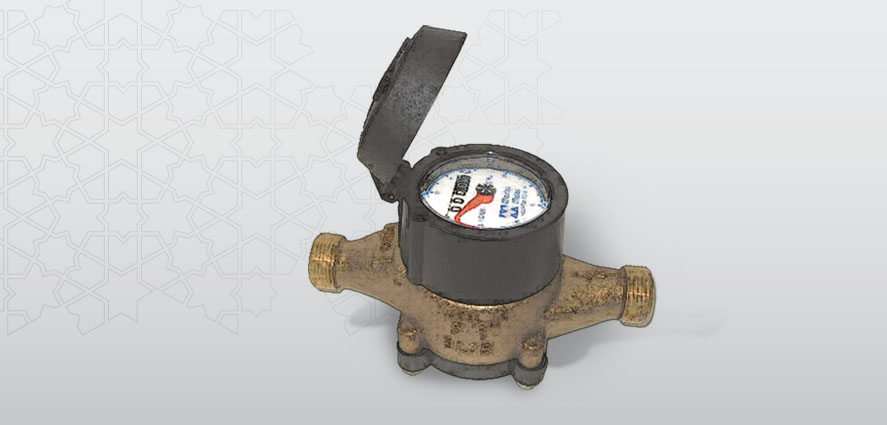
Experience from other parts of the world shows that water tariffs are an effective instrument to lower demand. Given that Abu Dhabi's water tariffs are still highly subsidised, a progressive increase in the water tariff could substantially reduce current water demand. The reason is that 25–30% of desalinated water is used for vegetation, including amenity plantations, and home gardens in private households.
Increased water tariffs would primarily affect outdoor household water use, since it is less critical to daily life, and would also encourage consumers to adopt water conservation measures within the home.
Putting a cost to the use of water will also help to raise awareness of the issue as well as focus attention on fixing leaks in the system, which by some estimates may reach 18-20% of supply.
Alternatives Technologies – ‘Water from Thin Air'
In addition to the well-established desalination technologies, there are alternative ways of producing water that may have potential for Abu Dhabi. Anyone who has visited Abu Dhabi will notice the relative humidity, which averages over 60% year-round.
One technology, already tested in Abu Dhabi at Al Aryam Island, is a ‘seawater greenhouse' which uses seawater and evaporative techniques to condense irrigation water from the humid air induced within the greenhouse.
Other technologies, both proven and under development, may hold some potential for Abu Dhabi, especially for agricultural or more remote areas – using techniques that precipitate water out of humid air or fog.
Alternative Desalination Strategies

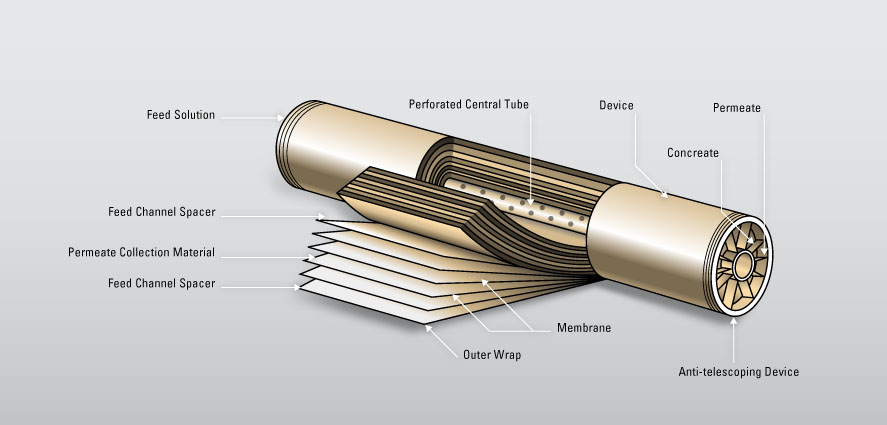
There are alternatives to MSF seawater distillation that are more energy efficient, use less source water and discharge less wastewater. Where energy generation is not a project requirement, Reverse Osmosis (RO) is generally preferred, since its membrane filter process is more energy efficient than non-cogeneration MSF methods. Also, although RO brine is more concentrated, less is produced and at lower temperatures than by thermal processes, potentially reducing marine environmental impacts.
In addition, RO is generally better suited for smaller-scale uses than MSF; therefore, it is often used for treating brackish groundwater for agricultural uses or small communities. However, making extensive use of groundwater desalination may have adverse impacts on the already depleted groundwater resources.
Another potential technology is Solar Thermal Desalination, using the sun's energy to desalinate seawater. However, given current solar technology, large-scale applications may not yet be practical.
Alternative Energy Sources
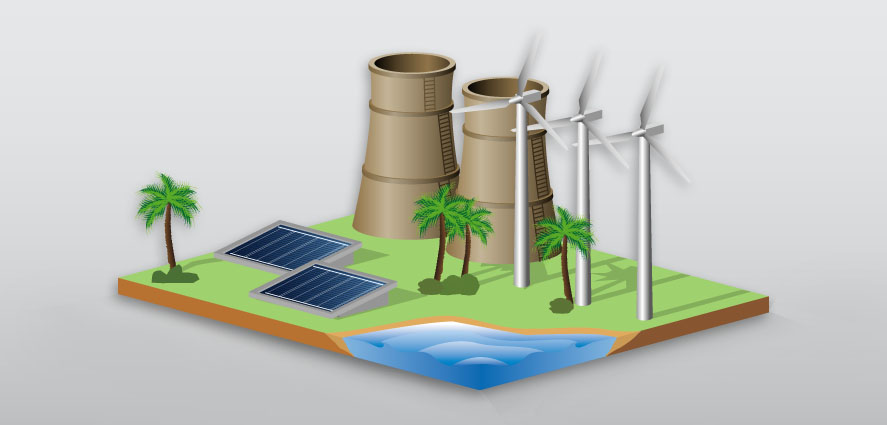
While burning fossil fuels to produce energy may be logical in an oil-rich region such as the Arabian Gulf, it is clear that future reliance on this energy source has high economic and environmental costs. While the UAE continues to evaluate alternative green energy sources such as solar, wind, wave and ocean thermal energy conversion (OTEC), it is estimated that even aggressive development of these sources could only supply 6–7% of peak electricity demand by 2020.
When considering the range of conventional and alternative energy sources, nuclear power becomes increasingly attractive as a proven, environmentally promising and commercially competitive option for meeting future energy and water demand.
Abu Dhabi has announced a programme to develop nuclear power plants to help meet its future requirements. In addition, Masdar has plans to develop hydrogen-fired power plants using natural gas as a feedstock, which will include carbon sequestration through injection of the C02 into oil wells.

















